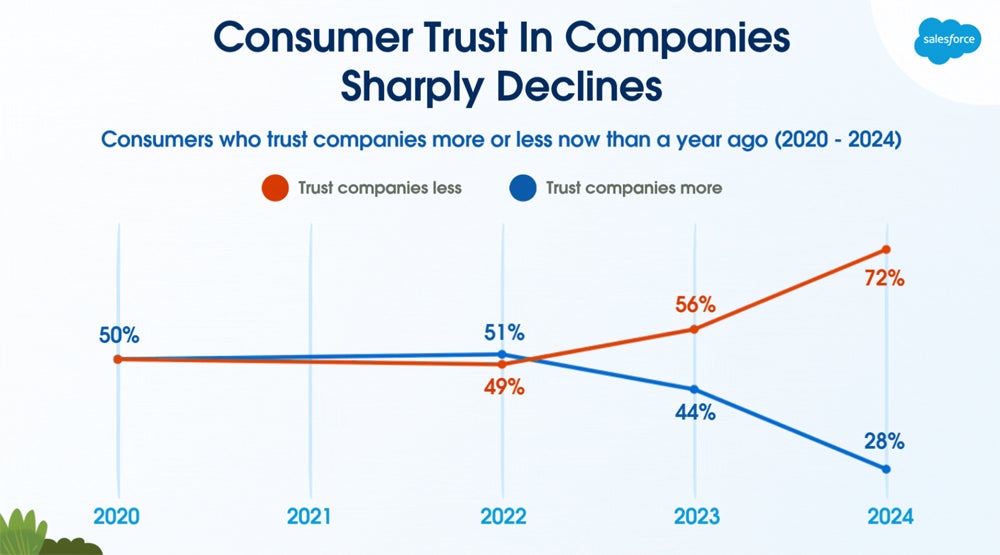Can Data Pros Tackle Singapore's Data Maturity Crisis? (original) (raw)
A new survey by CRM software firm Salesforce revealed that 61% of consumers in Singapore believe that companies are reckless with the customer data they provide, while 74% trust companies less than they did a year ago.
The State of the AI Connected Customer research also found customers in Singapore were expecting more from companies when they do provide data. For instance, 75% of consumers wanted consistent interactions across departments, while 71% wanted fewer touchpoints to complete tasks.
The survey also shows that IT, data, and AI professionals are fighting to retain customer trust while leveraging the power of data and AI in Singapore. Customers now trust organisations less — most likely due to loose data practices and data breaches — and may be less willing to hand over data in the future.
Most Singaporeans do not trust businesses with their data
Singapore customers appear to be increasingly suspicious of the way companies collect and manage their data. A survey conducted by Ping Identity in 2024, for example, found that of all surveyed Singapore consumers, the vast majority (86%) do not fully trust organisations that manage their identity data.

The trust customers have in companies is declining around the globe. Source: Salesforce
The trend is unsurprising, given the rising awareness of data mishandling and cyber breaches. In October 2024 alone, Singapore’s Personal Data Protection Commission issued three undertakings after ransomware attacks affected the personal data of over 690,000 individuals.
The Commission blamed the undertakings on “various ransomware attacks due to the insufficient security IT measures implemented” by organisations. They join a long list of 44 undertakings given in 2024, all based on potential contraventions of Singapore’s Personal Data Protection Act 2012.
The cyber threat environment is not helping trust. A recent cyber security survey from Cloudfare found that 41% of Asia-Pacific respondents, including Singaporeans, said their organisation experienced a data breach in the past 12 months, with 47% suffering from more than 10 data breaches.
SEE: Three-quarters of companies retain an increasing amount of sensitive data
The problem conditions for data are leading to consumer concerns. An IDC report conducted for APAC-based data management company Affinidi found that 59% of businesses indicated they are still struggling with security concerns from customers during the customer registration process.
Personalisation is preferred, but Singapore businesses are ill-prepared
While customers are more wary of trusting companies with data, they also want the customer experiences that flow from handing over data. For instance, a 2021 survey from OpenText found 71% of Singaporean consumers are more likely to buy again from brands that provide them with personalised service.
“Customers face a dilemma: the desire for personalised experiences… while at the same time, discerning how much data they should share to achieve such a goal,” the IDC report said. “Businesses must navigate the fine line between delivering tailored experiences and proving they can protect customers’ data.”
According to IDC research, businesses in Singapore are more focused on achieving profitable growth and customer acquisition than personalising experiences. In other parts of the world, such as North America, competition has driven businesses to make personalisation using data a top priority.
SEE: Australian organisations need to build trust with consumers over data and AI
Singapore businesses may mature their data management skills to personalise their experiences further in the future. However, 55.5% of businesses surveyed for the IDC report highlighted data collection and management as a key challenge, especially given the current cybersecurity landscape.
Perfecting data management a wise first step before AI
Salesforce thinks AI could help reinforce customer trust. Its survey showed younger users in Singapore, in particular, were open to interacting with AI agents; millennials (53%) and Gen Z (47%) were most open to AI agents that enhanced the customer experience with personalised and valuable content.
However, the successful deployment of AI, with its heavy reliance on underlying data to be effective, may require organisations to get better at managing data first. As IDC’s report said: “Only when a business has earned the customers’ trust do they then feel comfortable enough to share more data.”
IDC identified several challenges Singapore businesses must overcome to improve data management:
- Data fragmentation: Businesses are struggling to unify customer data stored in disparate systems, which hinders their ability to manage data and create personalised experiences.
- Scalability and security: Keeping up with data maintenance and security demands as businesses scale while also facing growing threats from cyber criminals in the region.
- Evolving data privacy regulations: Companies face increasing complexity in managing data across different jurisdictions, with countries implementing more stringent privacy laws.
Tenable’s data and cloud security expert, Liat Hayun, recently told TechRepublic that it might be better for APAC organisations to think of data as “fuel” rather than “gold.” Thinking of data this way will allow them to better mitigate risks such as data breaches while leveraging the value of data for their business.
“Fuel obviously has a lot of benefits,” Hayun explained. “You can fly an airplane with fuel. But it’s also risky if you don’t store fuel correctly and securely with the right mechanisms, and it spills over or causes a fire. That’s obviously the risk you’re taking, and there is this balance.
“With data, I think we’re now starting to understand it is similar; it is not this neutral asset that you just store and accumulate and it has only benefits that allow your business to move faster and forward. It has risk associated with it. So you need to take into account and to balance those two things.”